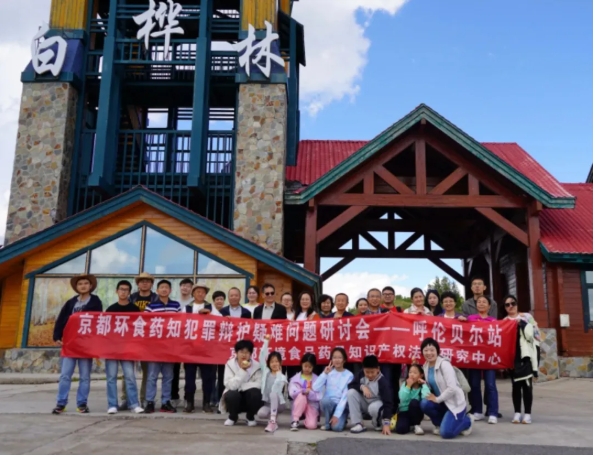On August 17, 2025, the Seminar on Difficult Issues in Environmental, Food, Drug, and Intellectual Property Crime Defense, co-hosted by the Beijing King&Capital Environmental, Food, Drug, and Intellectual Property Law Research Center and the Grassland Wolf Criminal Defense Team, and organized by the Grassland Wolf Criminal Defense Team, was successfully held in Hailar District, Hulunbuir City.
Professor Han Xu, PhD supervisor from the School of Law at Sichuan University; Zhang Xuanjing, former senior judicial accountant and certified public accountant from the procuratorial authorities; Xu Zongxin, Vice President of the Shanghai Bar Association and Managing Partner of Shanghai Jinglin Law Firm; Cao Chunfeng, founder of the Grassland Wolf Criminal Defense Team and Senior Partner at Inner Mongolia Shouzheng Law Firm; Tang Jianbin, Director of the King&Capital Environmental, Food, Drug, and Intellectual Property Law Research Center; Zhang Sijia, Deputy Director and Secretary-General of the King&Capital Environmental, Food, Drug, and Intellectual Property Law Research Center; Lyu Yan, Deputy Director of the King&Capital Environmental, Food, Drug, and Intellectual Property Law Research Center; He Wentao, Deputy Director of the Yinchuan Branch Center; Cao Yan, PhD from Southwest University of Political Science and Law; local lawyers and colleagues from the Hulunbuir City Bar Association; and colleagues from Guohao (Shanghai) Law Firm, among over 40 others, attended the offline event, while over 1,000 people participated in the live stream and discussions online.
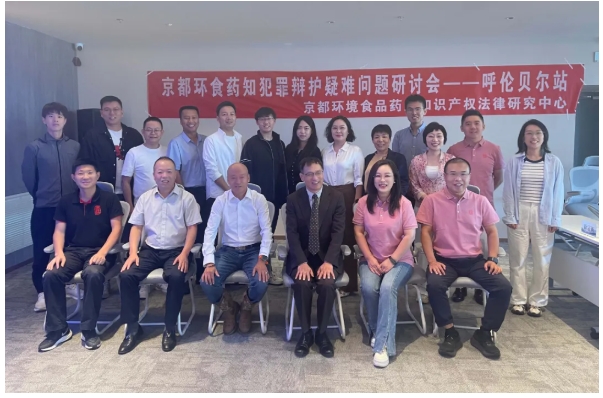
This seminar focused on the topic of “Challenging Issues in Environmental, Food, Drug, and Intellectual Property Crime Defense,” aiming to exchange experiences, spark intellectual discussions, identify issues, and reach consensus, thereby further improving relevant legal systems, promoting source governance and rule of law construction, and establishing a governance framework characterized by sound laws and good governance.
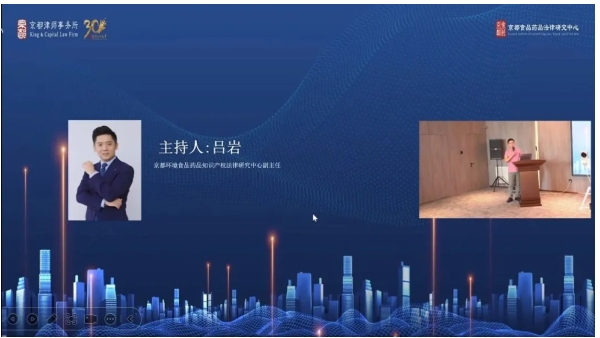
Lü Yan
Lu Yan, Deputy Director of the King&Capital Environmental, Food, Drug, and Intellectual Property Law Research Center, first expressed gratitude to Cao Chunfeng, the host lawyer, for his warm and meticulous arrangements, and thanked all the guests and colleagues who participated in the on-site activities. He briefly introduced the growth journey and platform development of the King&Capital Environmental, Food, Drug, and Intellectual Property Law Research Center, and once again urged and invited lawyers from across the country, members of the legal community, and visionary individuals dedicated to research in the environmental, food, drug, and intellectual property fields to join the center and collaborate on development.
Workshop Sharing Session Drawing on his extensive case handling experience, Tang Jianbin introduced practical cases and provided a detailed analysis of the identification of counterfeit drugs and counterfeit drug production activities, the different applications of counterfeit drug crimes and counterfeit drug sales crimes and their impact on sentencing, the identification of counterfeit drug amounts, the legal basis for criminal附带民事公益诉讼 (criminal附带民事公益诉讼), and the impact of victims waiving their right to compensation on公益诉讼 (public interest litigation). He also outlined the corresponding defense strategies.
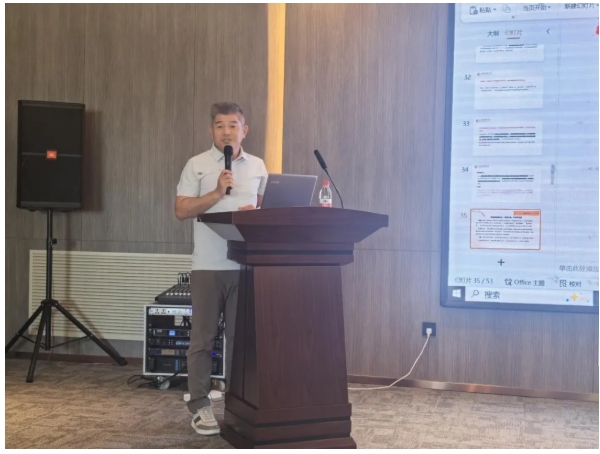
Xu Zongxin
Xu Zongxin, Vice President of the Shanghai Bar Association and Director of Shanghai Jinglin Law Firm, engaged in a discussion with Tang Jianbin. Xu emphasized that the factual circumstances and legal application of such crimes often involve interdisciplinary connections and disputes across different branches of law, making them complex and challenging cases. He stressed the importance of actively involving expert consultants to address specialized issues, thereby better persuading judges to adopt defense arguments.
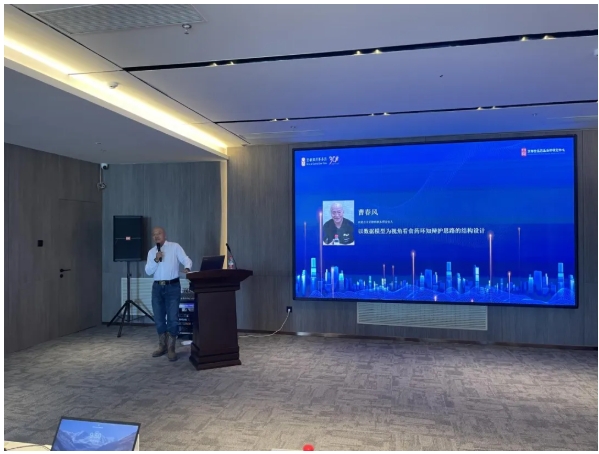
Cao Chunfeng
The second speaker was Cao Chunfeng, founder of the Grassland Wolf Criminal Defense Team and senior partner at Inner Mongolia Shouzheng Law Firm. His presentation was titled “Structural Design of Defense Strategies for Food, Drug, Environmental, and Intellectual Property Crimes from a Data Modeling Perspective.” Cao first emphasized the practical significance and necessity of classifying environmental, food, drug, and intellectual property cases. He pointed out that the special nature of defending such cases lies in the fact that most of these crimes are administrative offenses. He suggested drawing on his innovative “9+1 criteria defense method” from drug crime defense, which involves advancing the defense in the administrative law domain first to seek acquittal, Subsequently, by combining the 9+1 criteria defense method with flexibility in defense strategies, the framework for defending environmental, food, drug, and intellectual property crimes can be constructed by considering the subject, procedure, evidence, elements of the crime, sentencing circumstances, and other factors.
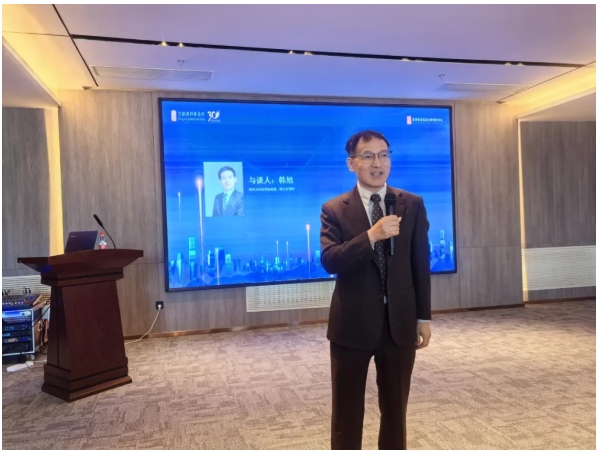
Han Xu
Professor Han Xu, a doctoral supervisor at the School of Law, Sichuan University, provided a commentary on Attorney Cao's presentation. He noted that Attorney Cao's presentation was practical and innovative, particularly the point that case file facts do not necessarily equate to factual case circumstances. He also affirmed Attorney Cao's proposed “pre-emptive + 9+1+N defense strategy.” Han Xu emphasized that to effectively defend environmental, food, drug, and intellectual property cases, one must comprehensively address six key aspects, including expert witness testimony, social harmfulness, the relationship between general and specific provisions, and the consistency of subjective and objective elements, to achieve optimal defense outcomes.
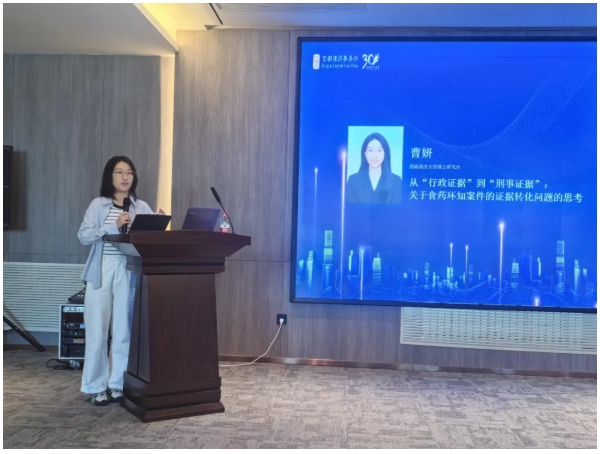
Cao Yan
The third speaker was Dr. Cao Yan from Southwest University of Political Science and Law, whose presentation was titled “From ‘Administrative Enforcement Evidence’ to ‘Criminal Evidence’: Reflections on the Issue of Evidence Conversion in Food, Drug, Environmental, and Intellectual Property Cases.” In such cases, some evidence originates from the administrative enforcement phase, and how to convert “administrative enforcement evidence” into “criminal evidence” has become a critical issue in practice. Dr. Cao Yan offers four insights into the rule-building approach for evidence conversion in food, drug, environmental, and intellectual property cases: First, clearly define the scope of evidence that can be converted into criminal evidence, distinguishing between what can be directly converted and what can only serve as leads to guide subsequent investigations; second, establish a mechanism for reviewing the legality of evidence in the “administrative-criminal” transition of such cases from both formal and substantive perspectives; third, ensure that the defense has equal opportunities for confrontation and redress; Fourth, improve the expert witness system to help legal professionals overcome professional barriers.
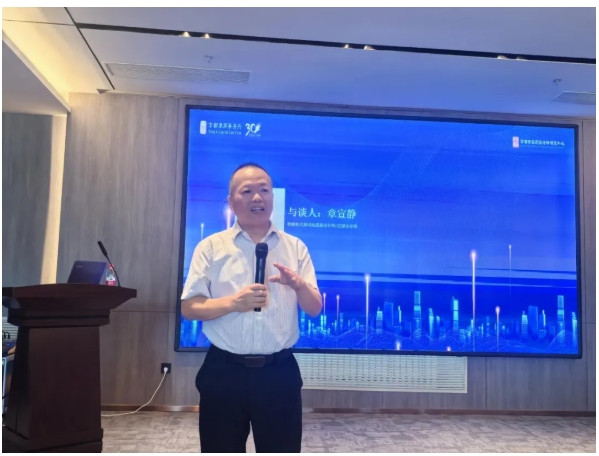
Zhang Xuanjing
Zhang Xuanjing, a former senior judicial accountant and certified public accountant at the procuratorate, pointed out as a discussant that it is necessary to clarify the root causes of the chaotic phenomenon of “expert reports, audit reports, testing (inspection) reports, etc.” frequently appearing in criminal cases. Only then can financial data and fund analysis and statistical evidence under various names such as judicial accounting expertise be effectively cross-examined, thereby achieving good defense results.
Appointment of Expert Advisors and Researchers<BR /><BR /><BR /><BR /><BR /><BR />Image<BR /><BR /><BR />During the tea break, Tang Jianbin, Director of the King&Capital Environmental, Food, Drug, and Intellectual Property Law Research Center, and Cao Chunfeng, founder of the Grassland Wolf Criminal Defense Team, presented appointment certificates to Professor Han Xu and Zhang Xuanjing.
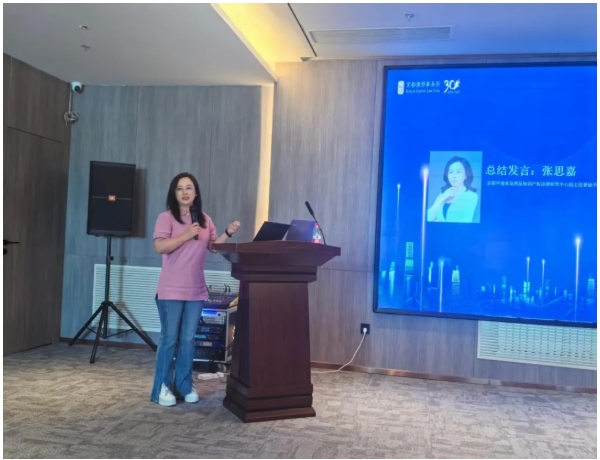
Zhang Sijia, Deputy Director and Secretary-General of the King&Capital Environmental, Food, Drug, and Intellectual Property Law Research Center, presented the appointment certificate for researcher to Dr. Cao Yan from Southwest University of Political Science and Law.
She provided a brief summary and overview of the content presented by the aforementioned speakers, noting that such crimes involve issues of administrative and criminal law. She emphasized the importance of leveraging the dual legislative framework of administrative and criminal law as a starting point, strictly distinguishing between administrative violations and criminal offenses, and conducting a defense based on the principle that the actions do not constitute a crime.
She emphasized the importance of conducting a comprehensive evaluation of the social harmfulness of the behavior, and urged the courage and skill to utilize the “but clause” provision of Article 13 of the Criminal Law as a starting point for criminal defense, applying the judicial interpretation of the “but clause” to achieve acquittal in accordance with the law. Additionally, she stressed the importance of focusing on the determination of prior illegality and the judicial recognition of administrative offenses, which must be based on the premise that the behavior violates relevant administrative laws and regulations from the perspective of the principle of the unity of the legal order.
She also emphasized the importance of conducting a substantive evaluation of the illegality, conducting a review of relevance, and strengthening the application of the exclusionary rule for evidence lacking relevance. For expert opinions or test reports with unclear sources of evidence, one should be adept at raising objections from the perspective of relevance to argue that such evidence lacks probative value. One should also actively apply the expert witness testimony system.
Finally, Attorney Zhang Sijia introduced the center's upcoming activities to the attendees.
